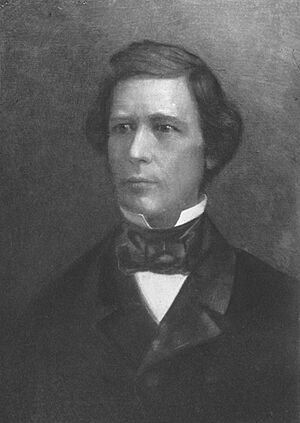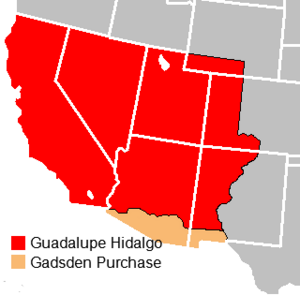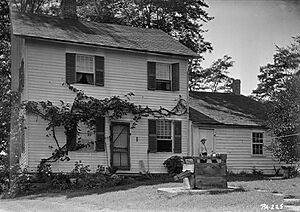David Wilmot facts for kids
Quick facts for kids
David Wilmot
|
|
|---|---|
 |
|
| Judge of the United States Court of Claims | |
| In office March 7, 1863 – March 16, 1868 |
|
| Appointed by | Abraham Lincoln |
| Preceded by | Seat established by 12 Stat. 765 |
| Succeeded by | Samuel Milligan |
| United States Senator from Pennsylvania |
|
| In office March 14, 1861 – March 3, 1863 |
|
| Preceded by | Simon Cameron |
| Succeeded by | Charles R. Buckalew |
| Member of the U.S. House of Representatives from Pennsylvania's 12th district |
|
| In office March 4, 1845 – March 3, 1851 |
|
| Preceded by | George Fuller |
| Succeeded by | Galusha A. Grow |
| Personal details | |
| Born | January 20, 1814 Bethany, Pennsylvania, U.S. |
| Died | March 16, 1868 (aged 54) Towanda, Pennsylvania, U.S. |
| Resting place | Riverside Cemetery Towanda, Pennsylvania |
| Political party | Democratic (until 1848) Free Soil (from 1848) Republican (from 1854) |
| Spouse | Anna Morgan |
| Children | 3 |
| Signature |
.
|
David Wilmot (January 20, 1814 – March 16, 1868) was an American politician and judge. He is famous for proposing the Wilmot Proviso. This idea aimed to stop slavery from spreading into new lands the United States gained from Mexico. Wilmot served as a Representative and a Senator for Pennsylvania. He also worked as a judge in the Court of Claims. He played a key role in starting the Republican Party in Pennsylvania.
Contents
David Wilmot: Early Life and Career
David Wilmot was born on January 20, 1814, in Bethany, Pennsylvania. He went to school at Beech Woods Academy and Cayuga Lake Academy. After school, he studied law with important judges in Pennsylvania. He became a lawyer in 1834 and worked in Towanda.
Serving in Congress
Wilmot was elected to the United States House of Representatives as a Democrat. He represented Pennsylvania from 1845 to 1851. During this time, a big debate about slavery was happening in the country.
The Wilmot Proviso: A Big Idea
When Wilmot joined Congress, the United States was fighting the Mexican–American War. President James K. Polk wanted money to make a peace treaty with Mexico. This treaty would likely give the U.S. new lands.
In August 1846, Wilmot suggested an important change to the money bill. His idea was called the Wilmot Proviso. It said that slavery should never be allowed in any new land gained from Mexico. This meant that if the U.S. got new territories, they would be free.
Wilmot based his idea on the Northwest Ordinance of 1787. This older law had also banned slavery in new territories. Wilmot and others believed slavery hurt "laboring white men." They wanted to keep new lands open for free workers.
Wilmot explained that he was not trying to end slavery where it already existed. He just wanted to stop it from spreading into new, free areas. He believed that if slavery was kept in its current limits, it would eventually disappear.
The House of Representatives voted for the Wilmot Proviso. But the United States Senate did not agree. They ended their meeting without approving the bill with Wilmot's idea.
The Free Soil Movement
The Wilmot Proviso became a very important topic in American politics. It showed the growing disagreement between the North and the South over slavery.
In 1848, the Democratic Party did not support the Wilmot Proviso. This led many people, including Wilmot, to join a new group. This group formed the Free Soil Party. Their main goal was "No more slave states and no more slave territory."
Wilmot strongly identified with the Free Soil movement. He believed that new territories should be places where "free white labor" could thrive. He thought slavery brought "disgrace" to free workers.
Later Public Service
After his time in the House, Wilmot became a judge. He served as a judge for the Pennsylvania Court of Common Pleas from 1851 to 1861.
He also helped create the Republican Party in 1854. This new party was against the spread of slavery. Wilmot was a key leader and worked hard for the first Republican presidential candidate, John C. Fremont.
In 1861, Wilmot was elected to the United States Senate. He served until 1863. He was also part of the Peace Convention of 1861. This meeting tried to find ways to prevent the American Civil War.
President Abraham Lincoln later nominated Wilmot to be a judge on the United States Court of Claims. He started this job in 1863 and served until his death. David Wilmot passed away on March 16, 1868. He is buried in Riverside Cemetery in Towanda, Pennsylvania.
His Family and Legacy
David Wilmot was the son of Randall and Mary Wilmot. His father was a successful merchant. In 1836, David married Anna Morgan. They had three children, but sadly, none of them lived past childhood.
Wilmot's ideas had a lasting impact. A historical marker in Towanda, Pennsylvania, honors him. His former home, the Wilmot House, is listed on the National Register of Historic Places. The David Wilmot School is also named after him.


 | Janet Taylor Pickett |
 | Synthia Saint James |
 | Howardena Pindell |
 | Faith Ringgold |

